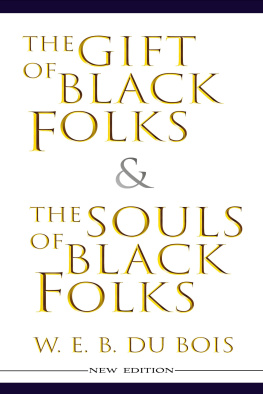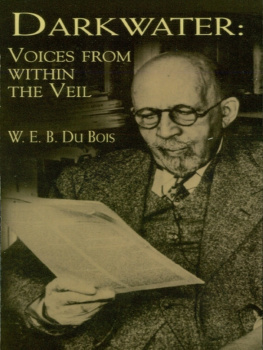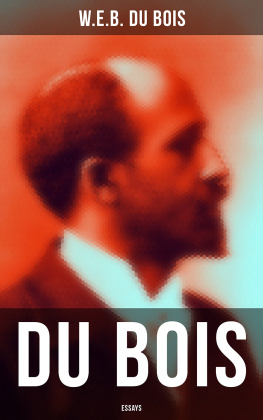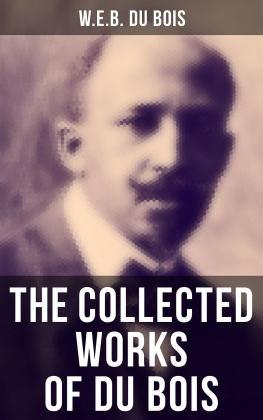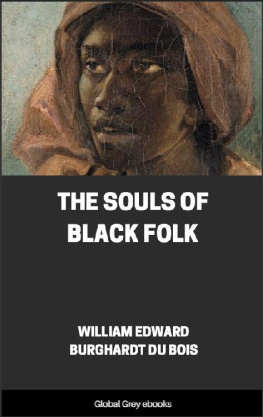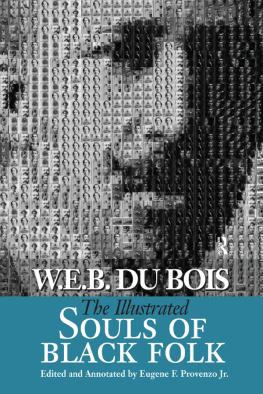The Gift of Black Folk &
The Souls of Black Folk
The Gift of Black Folk &
The Souls of Black Folk
W. E. B. Du Bois
W
Wisehouse Classics
W. E. B. Du Bois
The Gift of Black Folk & The Souls of Black Folk
W
Wisehouse Classics
2020 Wisehouse Publishing | Sweden
All rights reserved without exception.
ISBN 978-91-7637-775-8
Contents
~THE GIFT OF BLACK FOLK~
The Negros in the Making of America
(1924)
Prescript
Who made America?
Who made this land that swings its empire from the Atlantic to the Sea of Peace and from Snow to Firethis realm of New Freedom, with Opportunity and Ideal unlimited?
Now that its foundations are laid, deep but bare, there are those as always who would forget the humble builders, toiling wan mornings and blazing noons, and picture America as the last reasoned blossom of mighty ancestors; of those great and glorious world builders and rulers who know and see and do all things forever and ever, Amen!
How singular and blind!
For the glory of the world is the possibilities of the commonplace and America is America even because it shows, as never before, the power of the common, ordinary, unlovely man. This is real democracy and not that vain and eternal striving to regard the world as the abiding place of exceptional genius with great black wastes of hereditary idiots.
We who know may not forget but must forever spread the splendid, sordid truth that out of the most lowly and persecuted of men, Man made America. And that what Man has here begun with all its want and imperfection, with all its magnificent promise and grotesque failure will some day blossom in the souls of the Lowly.
I
The Black Explorers
How the Negro helped in the discovery of America
and gave his ancient customs to the land.
Garcia de Montalvo published in 1510 a Spanish romance which said: Know ye that on the right hand of the Indies there is an island called California very near the Terrestrial Paradise which is peopled with black women without any men among them, because they were accustomed to live after the fashion of the Amazons. They were of strong and hardy bodies, of ardent courage and of great force.
The legend that the Negro race had touched America even before the day of Columbus rests upon a certain basis of fact. First, the Negro countenance, clear and unmistakable, occurs repeatedly in Indian carvings, among the relics of the Mound Builders and in Mexican temples.
There can be no question whatever as to the reality of the statement in regard to the presence in America of the African pombeiros
Wiener thinks The presence of Negroes with their trading masters in America before Columbus is proved by the representation of Negroes in American sculpture and design, by the occurrence of a black nation at Darien early in the 16th century, but more specifically by Columbus emphatic reference to Negro traders from Guinea, who trafficked in a gold alloy, guanin, of precisely the same composition and bearing the same name, as frequently referred to by early writers in Africa.
And thirdly, many of the productions of America which have hitherto been considered as indigenous and brought into use especially by the Indians, may easily have been African in origin, as for instance, tobacco, cotton, sweet potatoes, and peanuts. It is quite possible that many if not all of these came through the African Negro, being in some cases indigenous to Negro Africa and in other cases transmitted from the Arabs by the Negroes. Tobacco particularly was known in Africa and is mentioned in early America continually in connection with the Negroes. All of these things were spread in America along the same routes, starting with the mingling of Negroes and Indians in the West Indies and coming up through Florida and on to Canada. The Arawak Indianswho especially show the effects of contact with Negroesand fugitive Negroes, together with Negroid Caribs, migrated northward and it was they who led Ponce de Leon to search for the Fountain Bimini where old men became young.
Oviedo says that the sweet potato came with that evil lot of Negroes and it has taken very well and it is profitable and good sustenance for the Negroes of whom there is a greater number than is necessary on account of their rebellions. In the same way, maize and sugar cane may have been imported from Africa.
Further than this, the raising of bread roots, manioc, yam and sweet potatoes may have come to America from Guinea by way of Brazil. From Brazil the culture of these crops spread and many of the words referring to them are of undoubted African origin.
Negroes probably reached the eastern part of South America from the West Indies while others from the same source went north along the roads marked by the Mound Builders as far as Canada.
The chief cultural influence of the Negro in America was exerted by a Negro colony in Mexico, most likely from Teotihuacan and Tuxtla, who may have been instrumental in establishing the city of Mexico. From here their influence pervaded the neighboring tribes and ultimately, directly or indirectly, reached Peru [Wiener].
The mounds of the Mound Builders were probably replicas of Negro forts in Africa. That this tendency to build forts and stockades proceeded from the Antilles, whence the Arawaks had come in the beginning of the sixteenth century, is proved by the presence of similar works in Cuba. These are found in the most abandoned and least-explored part of the island and there can be little doubt that they were locations of fugitive Negro and Indian stockades, precisely such as were in use in Africa. It is not possible to prove the direct participation of the Negroes in the fortifications of the North American Indians, but as the civilizing influence on the Indians to a great extent proceeded from Cuba over Florida towards the Huron Country in the north, the solution of the question of the Mound Builders is to be looked for in the perpetuation of Arawak or Carib methods, acquired from the Negroes, as well attested by Ovandos complaint in 1503 that the Negroes spoiled the manners of the Indians; and transferred to the white traders, who not only adopted the methods of theIndians, but frequently lived among the Indians as part of them, especially in Brazil where we have ample documentary evidence of the fact [Wiener].
All this is prehistoric and in part conjectural and yet, it seems reasonable to suppose that much in custom, trade and religionwhich has been regarded as characteristic of the American Indianarose from strong Negro influences of the pre-Columbian period.
After the discovery of America by Columbus many Negroes came with the early explorers. Many of these early black men were civilized Christians and sprung from the large numbers of Negroes imported into Spain and Portugal during the fifteenth century, where they replaced as laborers the expelled Moors. Afterward came the mass of slaves brought by the direct African slave trade.
From the beginning of the sixteenth century, mention of the Negro in America becomes frequent. In 1501 they were permitted to enter the colonies; in 1503 the Governor of Hispaniola sought to prohibit their transportation to America because they fled to the Indians and taught them bad manners. By 1506 they were coming again because the work of one Negro was worth more than that of four Indians. In 1518 the new sugar culture in Spain and the Canary Islands began to be transferred to the West Indies and Negroes were required as laborers. In 1521 Negroes were not to be used on errands because they incited Indians to rebellion and the following year they rose in rebellion on Diego Columbus mill. In 1540, in Quivera, Mexico, there was a Negro priest and in 1542 there were at Guamango, Mexico, three Brotherhoods of the True Cross of Spaniards, one of which was of Negroes and one of Indians.
Next page
